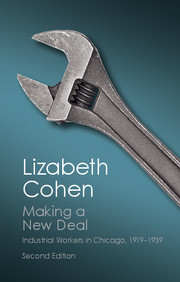Book contents
- Frontmatter
- Dedication
- Contents
- List of Illustrations
- List of Tables
- Acknowledgments
- Preface to the Second Edition
- Making a New Deal: Second Edition
- Introduction
- 1 Living and Working in Chicago in 1919
- 2 Ethnicity in the New Era
- 3 Encountering Mass Culture
- 4 Contested Loyalty at the Workplace
- 5 Adrift in the Great Depression
- 6 Workers Make a New Deal
- 7 Becoming a Union Rank and File
- 8 Workers' Common Ground
- Conclusion
- Notes
- Index
Conclusion
from Making a New Deal: Second Edition
Published online by Cambridge University Press: 05 October 2014
- Frontmatter
- Dedication
- Contents
- List of Illustrations
- List of Tables
- Acknowledgments
- Preface to the Second Edition
- Making a New Deal: Second Edition
- Introduction
- 1 Living and Working in Chicago in 1919
- 2 Ethnicity in the New Era
- 3 Encountering Mass Culture
- 4 Contested Loyalty at the Workplace
- 5 Adrift in the Great Depression
- 6 Workers Make a New Deal
- 7 Becoming a Union Rank and File
- 8 Workers' Common Ground
- Conclusion
- Notes
- Index
Summary
Chicago's factory workers inhabited a far different political, social, and cultural world in 1940 than they or their predecessors had twenty, or even ten, years earlier. Whereas once many had not voted, particularly in national elections, and often had harbored fears of the government infringing on their freedom, by the late 1930s most were loyal Democrats invested in an interventionist national government. Similarly, whereas previously, most recently in the 1919 era, factory workers' efforts to organize industrial unions had rarely survived for long, workers at last succeeded in organizing unions under the umbrella of the national CIO. Whereas earlier, working-class families had depended for their welfare needs on the informal networks and formal organizations of their ethnic communities and less reliably on their welfare capitalist employers, they now looked to government and unions for protection against threats as diverse as job layoffs, illness, and unstable banking institutions. Whereas once distinctive ethnic communities had circumscribed the cultural life of their members, workers' exposure to mass culture, the Democratic Party, and the CIO gave them more cultural experiences in common. National affiliations ranging from network radio fan to Democrat to CIO unionist had replaced workers' local, more parochial dependencies on neighborhood, ethnic group, and employer.
Information
- Type
- Chapter
- Information
- Making a New DealIndustrial Workers in Chicago, 1919–1939, pp. 361 - 368Publisher: Cambridge University PressPrint publication year: 2014
